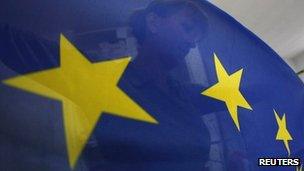Plea to sort out issue of EU entry for go-alone Scots
- Published

The briefing paper focused on an independent Scotland joining the EU
Scottish Secretary Michael Moore said the issue surrounding what would happen to EU membership for an independent Scotland needed "sorting out".
He was speaking to MPs after a House of Commons report questioned if a go-it-alone Scotland could automatically become a member of the European Union.
Mr Moore added that the SNP was being fanciful if it thought it would secure entry without negotiation.
The SNP believes an independent Scotland should join the EU.
The document produced by the House of Commons library said: "This [EU membership] is a major question in the independence debate, and one to which there is no clear answer.
"There is no precedent for a devolved part of an EU member state becoming independent and having to determine its membership of the EU as a separate entity, and the question has given rise to widely different views."
It outlined that there were three different possibilities under international law for the remainder of the UK and a newly-independent Scotland - continuation and secession; separation and dissolution.
The paper also said EU countries with their own domestic concerns about ''separatist movements'' might argue that ''Scotland should lose its membership on becoming independent, or hold up or even veto its accession".
It added: "Whatever the position under general international law, a decision on Scotland's status within the European Union is likely to be a political one.
"If all the EU member states agreed, then Scotland could continue automatically as a member state, pending negotiations with the other member states on details of membership, including the number of MEPs to represent Scotland."
At Scotland Questions at the House of Commons, Mr Moore told MPs: "The idea that the SNP is taking for granted that Scotland would enter into the European Union without negotiation and consideration of the EU issues is entirely fanciful.
"We need to get these issues sorted out. The uncertainty needs to be resolved sooner rather than later."
But the SNP said there was no uncertainty and the position over EU membership was "crystal clear".
A spokesman for First Minister Alex Salmond said that Scotland was already "an integral part of the EU" and as an independent state would be in "exactly the same position as the rest of the UK as a successor state".
He added: "Legal, constitutional and European experts have all confirmed that an independent Scotland would continue in EU membership.
"And how could it be otherwise, when Scotland has the lion's share of the EU's energy reserves, including oil and renewables?
"The fact is that the last major EU expansion in 2004 saw 10 new countries join - six of them smaller than Scotland, and six of which have become independent since 1990."
'Too feart'
Shadow Scottish Secretary and Labour MP Margaret Curran said Scotland would lose the strength of the current UK membership under independence.
She added: "Under the SNP plan there is a real risk that Scotland could end up out of the UK and out of Europe, or in Europe but obliged to immediately adopt the Euro. Both scenarios would be a disaster for the Scottish economy and Scottish exports.
"The fact that a separate Scotland would be a significant net contributor to EU coffers and the Euro bailout fund is extremely significant. The UK's strength within the EU gives Scotland a negotiating and bargaining edge that others just don't have."
Tory MSP David McLetchie said it was astonishing that the SNP were "afraid to spell out the consequences" of an independent Scotland in Europe.
He added: "People in Scotland need to have an answer to this question before we vote in an independence referendum. It is too important to be treated as an afterthought as it is fundamental to the whole independence project.
"Alex Salmond and the SNP may dispute the conclusions of this report but that does not relieve them of the duty to provide definitive answers to the questions it raises about our relationship with the EU and the Euro.
"Of course it could be that Alex Salmond is too feart to ask the EU these questions as he knows Scots won't like the answers."
- Published26 October 2011
- Published23 October 2011